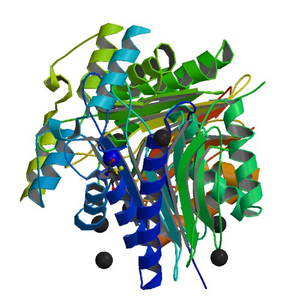Pegaspargase is a modified enzyme. It is a form of L-asparaginase which has undergone PEGylation. It is used as an anticancer (‘antineoplastic’ or ‘cytotoxic’) chemotherapy drug. It is indicated for the treatment of acute lymphocytic leukaemia (ALL), non-Hodgkin’s lymphoma and for treatment of patients who have had a hypersensitivity reaction to another form of asparaginase.
Biosimilars of pegaspargase
Biosimilars/General
|
Posted 30/06/2017
 0
Post your comment
0
Post your comment

The originator product, Baxalta’s Oncaspar (pegaspargase), was approved by the US Food and Drug Administration (FDA) in February 1994 and by the European Medicines Agency (EMA) in January 2016 [1]. Baxala (now part of Shire) acquired Oncaspar from Sigma-Tau Finanziaria in July 2015. The drug had sales of US$87 million for Baxalta in 2015, with historic annual sales of approximately US$1 billion.
Oncaspar does not appear to be covered by any patents. However, assuming 10 years of exclusivity in the European Union (EU) and 12 years in the US, then these periods will expire in 2026 in the EU and expired in 2006 in the US [1]. Some of the pegaspargase biosimilars and non-originator biologicals* approved or in development are presented in Table 1.
Table 1: Biosimilars and non-originator biologicals* of pegaspargase approved or in development
| Company name, Country | Product name | Stage of development |
| Amega Biotech, Argentina*
|
- | Investigation in acute lymphoblastic leukaemia in Argentina ongoing |
| Pfenex/Strides Acrolab, USA/India* | PF690 | Candidate undergoing preclinical/ bioanalytical characterization |
| *See editor’s comment | ||
The fact that no biosimilars makers are very far along the road to developing a pegaspargase biosimilar, despite the fact that the exclusivity on the originator product already expired in the US in 2006, highlights the costs involved and complexity in developing biosimilars.
Editor’s comment
It should be noted that ‘similar biotherapeutic products’ approved in Argentina or ‘similar biologics’ approved in India might not have been authorized following as strict a regulatory process as is required for approval of biosimilars in the European Union. The EMA (European Medicines Agency) regulatory requirements ensure the same high standards of quality, safety and efficacy for biosimilars as for originator biologicals, and also include a rigorous comparability exercise with the reference product.
Related article
Biosimilars of abatacept
Reference
1. Derbyshire M. Patent expiry dates for biologicals: 2016 update. Generics and Biosimilars Initiative Journal (GaBI Journal). 2017;6(1):27-30. doi:10.5639/gabij.2017.0601.006
Permission granted to reproduce for personal and non-commercial use only. All other reproduction, copy or reprinting of all or part of any ‘Content’ found on this website is strictly prohibited without the prior consent of the publisher. Contact the publisher to obtain permission before redistributing.
Copyright – Unless otherwise stated all contents of this website are © 2017 Pro Pharma Communications International. All Rights Reserved.
Source: ClinicalTrials.gov,EMA, US FDA
Research
Reaching ESG goals in pharmaceutical development
What is the future for the US biosimilar interchangeability designation
News
FDA approves third interchangeable ranibizumab biosimilar Nufymco
FDA approves Poherdy (first interchangeable pertuzumab) and Armlupeg (pegfilgrastim) biosimilars
Most viewed articles
The best selling biotechnology drugs of 2008: the next biosimilars targets
Global biosimilars guideline development – EGA’s perspective
Related content
Samsung Bioepis wins Pyzchiva case; Regeneron patent rulings threaten foreign biosimilars
Chinese biosimilars go global: growth, partnerships, and challenges
Stelara biosimilars enter US market with 85% discount in 2025
IFPMA publishes position on pharmacy-mediated substitution for biosimilars
Samsung Bioepis wins Pyzchiva case; Regeneron patent rulings threaten foreign biosimilars

Biosimilars/General Posted 30/07/2025
Chinese biosimilars go global: growth, partnerships, and challenges

Biosimilars/General Posted 30/04/2025
IFPMA publishes position on pharmacy-mediated substitution for biosimilars

Biosimilars/General Posted 21/03/2025
The best selling biotechnology drugs of 2008: the next biosimilars targets







Post your comment